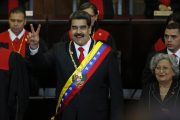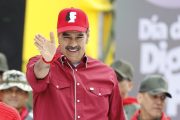The sanctions imposed by the State Department on Venezuela’s Marxist dictator Nicolas Maduro and his regime are being carefully staged in to maximize the pain inflicted on Maduro and his cronies, while minimizing the impact on the citizens of the country.
Last week State imposed sanctions on 13 of Maduro’s top people, accusing them of various human rights violations and, as a result, freezing any assets they might have within American jurisdiction. Following Sunday’s fraudulent election, State imposed similar sanctions on Maduro himself, freezing any assets he might personally have in the United States.
Although it’s unknown just how much, if any, of Maduro’s personal wealth would be affected by those new sanctions, what is known is that they prohibit any American entity from conducting business with him. This is part of Trump’s attempt to isolate Maduro and his government politically and impose economic sanctions that complicate greatly his attempts to obtain financing from offshore sources.
Trump’s administration has stayed away from placing similar sanctions on Maduro’s state-owned oil company, PdVSA (Petróleos de Venezuela, S.A.), which currently exports half of its production to the United States. Those 780,000 barrels of oil daily generate approximately $1 billion of revenue every month for the Marxist regime, raising the obvious question: Why does State allow U.S. refineries to continue to purchase Venezuelan crude and in the process support Maduro?
Part of the answer is that Venezuelan oil costs less, even after factoring shipping costs, for American refineries than does U.S.-generated oil. Another part of the answer is that Trump is being judicious about applying sanctions that only hurt the Maduro regime and not the citizens who are already suffering great privation under that regime. Call them “deliberately selective” sanctions.
Trump’s State Department is also playing the waiting game. Between now and the end of the year, Maduro is going to have to make principal and interest payments on some of the country’s massive external debt, estimated to total $150 billion. Starting in August and through the end of the year, Maduro will have to find $5 billion somewhere or else default. At present it is estimated that his treasury has just $3 billion in foreign reserves and $7 billion in gold bullion. Even with $1 billion flowing into his treasury from American refiners every month, one can do the math and conclude that, barring a miracle, or a bailout from China or Cuba or elsewhere, Maduro is in grave danger of defaulting. That would, for all intents and purposes, end his regime. Defaults would trigger seizures of various oil assets while cutting off whatever might remain of offshore financing to keep his corrupt administration afloat.
The end of Maduro would not necessarily end the suffering. Replacing one communist/Marxist thug with another would solve nothing. But the first step toward restoration of freedom for Venezuelans who have suffered under Chavism (Hugo Chavez’s socialist policies) and Maduro’s atrocities must begin with his removal from the scene.
That restoration and resurrection, once Maduro is gone, is going to take some time. For more than 20 years Chavistas (supporters of Chavism) have destroyed the country economically and culturally. Once freed from the yoke put in place by Chavez and applied with vengeance by Maduro, Venezuelans have vast oil reserves that can be turned to good use.
Venezuela’s proven reserves, at 300 billion barrels, exceed those of the world’s second largest holder, Saudi Arabia, which has 265 billion barrels. According to OPEC, the last time they did the calculation, these would supply the world with oil, at present rates of consumption, for 234 years!
Capital to develop those reserves, once Maduro is out of the picture, would flow back into the country. The facilities of PdVSA, which under Maduro have been allowed to deteriorate, would quickly be brought back online. The Maduro cronies currently populating the company would shortly be replaced with skilled and experienced workers who could quickly bring the facilities back to full and profitable production.
Looking to the future, the private development of those massive reserves would provide collateral, ripple-effect benefits. Poverty would slowly be replaced as workers in companies providing services to PdVSA again go back to work on a full-time basis, earning a full day’s wages for the first time in years. Venezuelans who have left the country to escape Maduro’s madness would likely return home, bringing with them the skills and abilities (and capital) needed in the recovery process.
The future for Venezuela is bright once the blight of Maduro and his socialist policies has been removed. Once again Venezuela could assume its rightful position as one of South America’s premier countries through the unshackling of its economy and its restoration of freedom.
Photo: Clipart.com
An Ivy League graduate and former investment advisor, Bob is a regular contributor to The New American magazine and blogs frequently at LightFromTheRight.com, primarily on economics and politics. He can be reached at [email protected].
Related article:
Sunday’s Phony Election in Venezuela Installs Marxist Dictatorship




